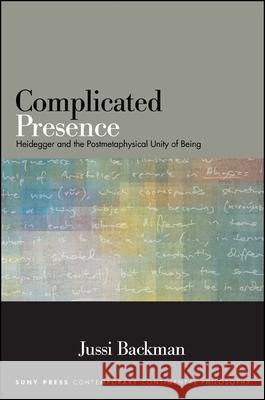Complicated Presence: Heidegger and the Postmetaphysical Unity of Being » książka
Complicated Presence: Heidegger and the Postmetaphysical Unity of Being
ISBN-13: 9781438456485 / Angielski / Miękka / 2016 / 374 str.
From its Presocratic beginnings, Western philosophy concerned itself with a quest for unity both in terms of the systematization of knowledge and as a metaphysical search for a unity of being--two trends that can be regarded as converging and culminating in Hegel's system of absolute idealism. Since Hegel, however, the philosophical quest for unity has become increasingly problematic. Jussi Backman returns to that question in this book, examining the place of the unity of being in the work of Heidegger. Backman sketches a consistent picture of Heidegger as a thinker of unity who throughout his career in different ways attempted to come to terms with both Parmenides's and Aristotle's fundamental questions concerning the singularity or multiplicity of being--attempting to do so, however, in a "postmetaphysical" manner rooted in rather than above and beyond particular, situated beings. Through his analysis, Backman offers a new way of understanding the basic continuity of Heidegger's philosophical project and the interconnectedness of such key Heideggerian concepts as ecstatic temporality, the ontological difference, the turn (Kehre), the event (Ereignis), the fourfold (Geviert), and the analysis of modern technology.











